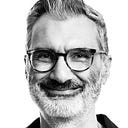Emma*, Anthony and I.
“We don‘t see things as they are, we see them as we are.” (Anaïs Nin)
Our canteen has nothing to envy to a spa restaurant. It is spacious, has plenty of daylight, a terrace, a pond, and a large garden, all in the middle of meadows and hills in the countryside of Bavaria. I realize what a luxury that is, especially after I return from business trips. One of the people with whom I enjoy having lunch with is Emma, a friendly and joyful colleague. Speaking to her you are surprised by her humbleness and her curious mind. Digging a bit deeper, you realize that she is an intellectual person, a feminist and an environmentalist all at once. Touching some political subjects, she doesn’t bulk expressing her point of views that, to my surprise, I find sometimes leftists.
I have to admit that I enjoy chatting with her because of our differences. Since I started my career I have been in sales and marketing and had to generate growth for the companies I worked for. Long gone are the teenage years when I believed in the utopian communism and the heroism of Che Guevara and his comrades. Somehow I got to believe that business growth and socialism are not compatible. Until I moved to Germany and discovered the concept of the social market economy. A system combining the benefits of both capitalism and socialism. To me, that system was already socialist. To Emma, it was rather capitalist.
Despite our opposite views, each seemed to understand and appreciate the other‘s way of seeing things. I jokingly called her an intellectual leftist. She retaliated by calling me an old-fashioned conservative. Our lunch discussions remained interesting intellectual exchanges and a good alternative to the usual small talk or business topics that one may engage in during lunch breaks. The one topic that touched me though and pushed me to reflect on my belief system was the immigrant crisis of 2015. To Emma, the West and especially Germany had the moral obligation to open its doors to the immigrants fleeing troubles at home and to help them find a secure place to live in. To me, this meant danger. I dreaded a conflict of civilizations taking place in Germany, my new homeland. I foresaw a replay of the still unresolved conflicts of Lebanon that were partially behind my decision to leave my country 14 years ago. I imagined my dark-haired kids being stared at as potential terrorists. I saw only my own fears and felt my new way of life endangered. To my surprise, I was actually sharing the point of view of the right-wing parties that would rather see me out of their country. I felt shame and insecurity at the same time. I was seeing things through the eyes of a person who grew amidst civil war. As I once read, “we don‘t see things as they are, we see them as we are”. (Anaïs Nin).
Anthony my son, who mostly grew-up in Germany and didn’t have a clue of what we‘ve gone through in Lebanon, surprised me one day after school by telling me that he was volunteering two weeks to help young refugees of his age in their school homework and other daily tasks. During these two weeks, he recounted horror stories of what these kids endured before and on their way to Germany. I imagined him in these situations. I had goosebumps, was humbled and felt empathy rather than fear. Through my 16-year-old son, I was able to see beyond my selfish interests.
Emma and Anthony saw this human tragedy as it is, a human tragedy. I saw it through the eyes of the person who lived a conflict.
Was I wrong to be selfish? I was. Should a relatively peaceful country like Germany ignore the dangers of an open door policy? Still though, I hope not.
*Emma is an altered name to preserve the anonymity of my colleague.
